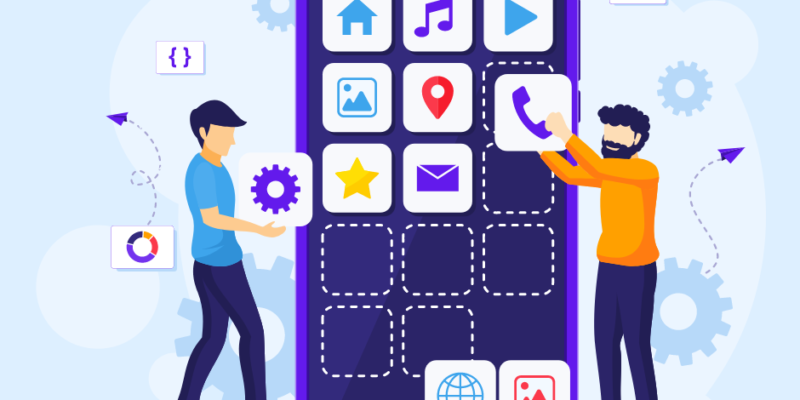
The advent of Artificial Intelligence (AI) and Machine Learning (ML) has revolutionized numerous industries, and mobile application development is no exception. These technologies are not just buzzwords; they are transforming the way mobile apps are developed, enhancing their functionality, and improving user experience. In this blog, we will explore the pivotal role of AI and ML in modern mobile apps, the benefits they bring, and how they are shaping the future of mobile application development.
The Integration of AI and ML in Mobile Apps
AI and ML are integrated into mobile apps to enable them to perform tasks that would traditionally require human intelligence. This includes understanding natural language, recognizing patterns, making decisions, and learning from experience. Here are some key areas where AI and ML are making a significant impact:
- Personalization: AI and ML algorithms analyze user behavior and preferences to deliver personalized content and recommendations. For instance, streaming services like Netflix and Spotify use these technologies to suggest movies, shows, and music based on users’ past activities.
- Enhanced User Experience: AI-powered chatbots and virtual assistants like Siri, Alexa, and Google Assistant have become integral parts of mobile apps. They provide users with instant support, answer queries, and perform tasks through voice commands, making interactions more natural and intuitive.
- Predictive Analysis: ML models analyze vast amounts of data to predict user behavior and trends. E-commerce apps, for example, use predictive analysis to forecast demand for products, optimize inventory, and offer personalized deals to customers.
- Image and Voice Recognition: Apps like Google Photos and Shazam leverage AI for image and voice recognition. These technologies enable users to search for photos by describing them or identify songs by simply humming the tune.
- Security and Authentication: AI and ML enhance security in mobile apps through biometric authentication methods such as facial recognition and fingerprint scanning. They also detect and prevent fraudulent activities by analyzing user behavior and identifying anomalies.
Benefits of AI and ML in Mobile App Development
The incorporation of AI and ML into mobile apps offers several benefits that are transforming the user experience and app functionality.
- Improved Efficiency: AI and ML automate repetitive tasks, allowing developers to focus on more complex aspects of app development. This leads to faster development cycles and more efficient resource utilization.
- Better Decision Making: AI and ML algorithms process vast amounts of data and provide insights that aid in better decision-making. This is particularly useful in apps related to finance, healthcare, and logistics, where accurate decisions are crucial.
- Enhanced User Engagement: Personalized experiences and predictive recommendations keep users engaged and satisfied. This leads to higher retention rates and increased user loyalty.
- Advanced Analytics: AI and ML provide advanced analytics capabilities that help developers understand user behavior, preferences, and pain points. This data-driven approach allows for continuous improvement and optimization of the app.
- Innovative Features: AI and ML enable the development of innovative features that were previously unimaginable. For instance, augmented reality (AR) apps that overlay digital information on the real world are powered by AI, creating immersive and interactive experiences.
Case Studies: AI and ML in Action
To better understand the impact of AI and ML in mobile apps, let’s look at some real-world examples:
- Uber: Uber uses AI and ML to optimize routes, predict demand, and set dynamic pricing. The app analyzes traffic patterns, user locations, and historical data to provide accurate ETAs and match riders with the most suitable drivers.
- Spotify: Spotify’s recommendation engine is powered by AI and ML. The app analyzes users’ listening habits, song preferences, and even the time of day to curate personalized playlists and suggest new music.
- Snapchat: Snapchat uses AI for its facial recognition filters, allowing users to apply various effects and animations to their selfies. The app’s ML algorithms analyze facial features in real-time to deliver accurate and entertaining filters.
The Future of AI and ML in Mobile Apps
The future of AI and ML in mobile apps is promising, with endless possibilities for innovation and improvement. Here are some trends to watch out for:
- Increased Personalization: As AI and ML technologies evolve, mobile apps will offer even more personalized experiences. Apps will anticipate users’ needs and preferences with greater accuracy, providing tailored content and services.
- Enhanced Security: AI and ML will play a crucial role in enhancing security features in mobile apps. From more sophisticated biometric authentication methods to advanced fraud detection systems, these technologies will make apps safer for users.
- Voice and Gesture Recognition: The use of voice and gesture recognition in mobile apps will become more prevalent. AI-powered virtual assistants will become more intuitive, understanding and responding to user commands with higher accuracy.
- Augmented Reality (AR) and Virtual Reality (VR): AI and ML will drive advancements in AR and VR technologies, creating more immersive and interactive experiences. Mobile apps will leverage these technologies for gaming, education, healthcare, and more.
- Improved Health Monitoring: In the healthcare sector, AI and ML will enable mobile apps to monitor health conditions more effectively. From analyzing vital signs to predicting potential health issues, these apps will provide valuable insights and support to users.
Conclusion
AI and ML are transforming the landscape of mobile app development, offering enhanced functionality, personalized experiences, and improved efficiency. As these technologies continue to evolve, they will open new avenues for innovation and redefine the capabilities of mobile apps. For any mobile application development company, embracing AI and ML is no longer optional but essential to stay competitive in the rapidly evolving digital landscape.
By leveraging the power of AI and ML, developers can create mobile apps that not only meet but exceed user expectations, providing value and convenience like never before. The future of mobile app development is undoubtedly intertwined with the advancements in AI and ML, and the possibilities are truly limitless.










